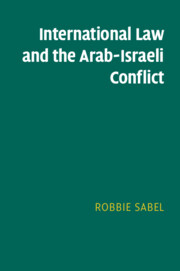Book contents
- International Law and the Arab-Israeli Conflict
- International Law and the Arab-Israeli Conflict
- Copyright page
- Contents
- Abbreviations
- Introduction
- 1 Is International Law Relevant?
- 2 The World War I
- 3 The Zionist Movement and the 1917 Balfour Declaration
- 4 Post–World War I and the 1922 League of Nations Mandate for Palestine, 1920–1947
- 5 The 1947 Partition Plan
- 6 Israel’s Declaration of Independence
- 7 The 1948 Arab-Israeli War
- 8 1949 Armistice Agreements
- 9 The Arab Refugee Problem
- 10 The 1967 Six Day War
- 11 UN Security Council Resolution 242
- 12 Camp David 1978
- 13 1979 Egypt–Israel Peace Treaty
- 14 Taba Arbitration
- 15 The Legality of Israeli Exploitation of Oil from Sinai
- 16 The Oslo Accords
- 17 Israel–Jordan
- 18 Post Oslo Developments
- 19 The Status of the ‘West Bank’ (Judea and Samaria) and the Gaza Strip
- 20 Israeli Settlements in the West Bank
- 21 Controversial Elements of Military Administration
- 22 Freedom of Navigation through International Waterways in the Region
- 23 Israel–Syria
- 24 Jerusalem
- 25 Controversial Laws of War Issues
- 26 Is Palestine a State?
- 27 Water Resources
- 28 Implications for Future Negotiations
- Index
13 - 1979 Egypt–Israel Peace Treaty
Published online by Cambridge University Press: 21 April 2022
- International Law and the Arab-Israeli Conflict
- International Law and the Arab-Israeli Conflict
- Copyright page
- Contents
- Abbreviations
- Introduction
- 1 Is International Law Relevant?
- 2 The World War I
- 3 The Zionist Movement and the 1917 Balfour Declaration
- 4 Post–World War I and the 1922 League of Nations Mandate for Palestine, 1920–1947
- 5 The 1947 Partition Plan
- 6 Israel’s Declaration of Independence
- 7 The 1948 Arab-Israeli War
- 8 1949 Armistice Agreements
- 9 The Arab Refugee Problem
- 10 The 1967 Six Day War
- 11 UN Security Council Resolution 242
- 12 Camp David 1978
- 13 1979 Egypt–Israel Peace Treaty
- 14 Taba Arbitration
- 15 The Legality of Israeli Exploitation of Oil from Sinai
- 16 The Oslo Accords
- 17 Israel–Jordan
- 18 Post Oslo Developments
- 19 The Status of the ‘West Bank’ (Judea and Samaria) and the Gaza Strip
- 20 Israeli Settlements in the West Bank
- 21 Controversial Elements of Military Administration
- 22 Freedom of Navigation through International Waterways in the Region
- 23 Israel–Syria
- 24 Jerusalem
- 25 Controversial Laws of War Issues
- 26 Is Palestine a State?
- 27 Water Resources
- 28 Implications for Future Negotiations
- Index
Summary
The negotiations over the Egypt-Israel Peace Treaty raised fundamental legal issues of conflict between different treaties and the right to collective self-defence. International law was unable to give unambiguous answers to these issues. The two parties have maintained the peace for over forty years not because of the legal wording of the Peace Treaty, but because it is in their national interests. To the best knowledge of the author, the parties have never had resource to the language of the Peace Treaty, except as regards the changes in the security arrangements, and settling the Taba dispute. Nevertheless, it was important for both sides to try and ensure legal language that represented their interests, and the Peace Treaty can be seen as an extremely successful example of legal draftsmanship. The language of the treaty was copied, nearly verbatim, in successive peace treaties that Israel signed with other Arab States. Begin and Sadat received the Nobel Peace prize, a leading textbook on treaty law chose a picture of the signing ceremony with Begin, Carter and Sadat as the photo on its cover, a compliment to the treaty drafting of Egypt and Israel, done with the help of the United States.
Keywords
- Type
- Chapter
- Information
- International Law and the Arab-Israeli Conflict , pp. 228 - 250Publisher: Cambridge University PressPrint publication year: 2022

